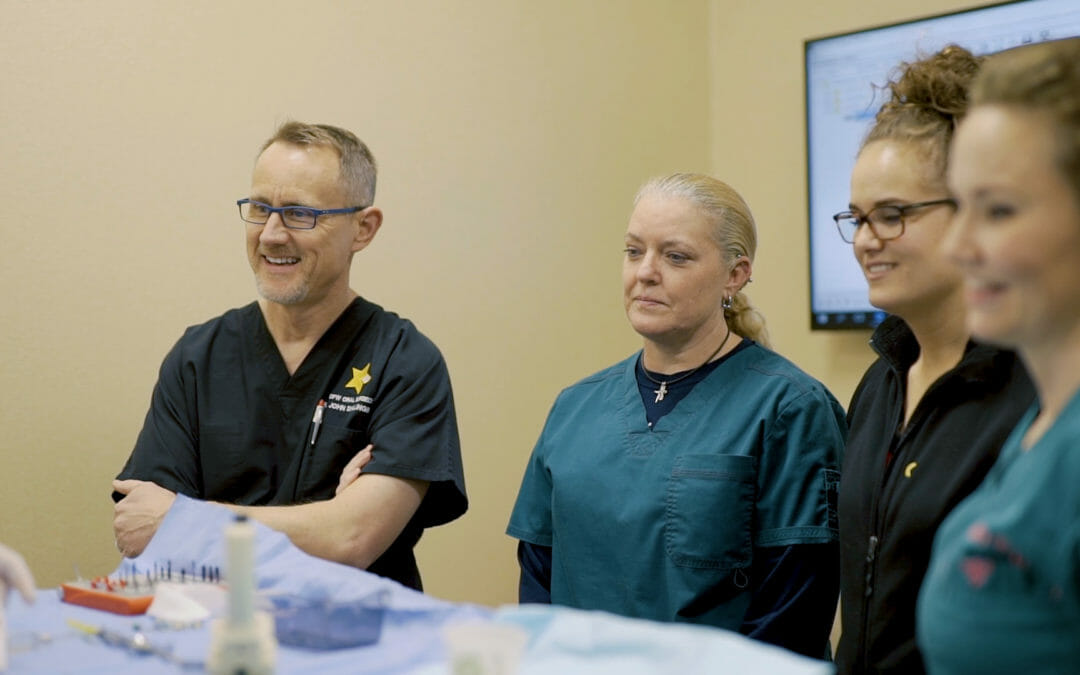The services of dentists are different from the services of an oral surgeon. Oral surgeons are specialists that handle a wide range of services that most dentists do not. They are well-equipped for certain procedures and work on the jawbone, teeth, face, gums and other oral structures. Dentists typically focus on oral healthcare. They typically perform oral exams, install dentures and bridges, place crowns, root planing, scaling, simple tooth extractions and perform root canals.
All of these services take skill, but they are slightly different from the services provided by a board-certified oral surgeon. These surgeons perform services like bone and gum grafting, placing implants, the removal of wisdom teeth, surgery for orthodonture, reconstructing the face, ridge expansion and more.
When you have a common oral health issue, you go to see your dentist for their skilled care. But when you need most oral surgeries, it’s time to see the oral surgeon.
Tooth Extractions
Tooth extractions are one of the most common reasons that people visit oral surgeons. When you need a tooth removed, it can be one of two kinds- a simple extraction or a surgical extraction. Many patients are surprised when they are referred to an oral surgeon for an extraction. But, this is often needed when there are certain problems with the tooth, such as it being impacted, broken under the gums, etc. When the job is a simpler one that doesn’t need any extra attention, it can be done by a dentist.
Dental Implants
Another common type of procedure that oral surgeons perform is installing dental implants. These are a replacement for teeth that are missing. They are surgically implanted by the surgeon so that the implants will be sturdy and ready for a crown. Implants are attached with a titanium screw that is implanted by the surgeon. After that has healed, it is the dentist who fits and installs a crown on top.
Often, a patient who needs an implant needs another procedure first to make the bone thick enough for the titanium screw. A bone graft is also done by your oral surgeon so that the foundation of the new tooth is solid. This procedure is safe and effective, and it’s something your oral surgeon will have years of practice with.
Another type of implant is dental implants that work with dentures. With this procedure, dental implants are installed that will hold the dentures in place. Many patients choose this way of replacing their teeth because you don’t have to remove the dentures for cleaning. They stay in your mouth like your original teeth. The implants provide firm anchors that let you wear dentures without having any problems with speaking or eating. This can be done either with partial dentures or full dentures.
No matter which type of implants you need, you will get an examination of your mouth, including the jaw, gums, teeth and other structures to determine the best way to help you with implants. And during the procedure, you will have a sedative to keep you comfortable and relaxed. Different types of sedation are available, depending on which type you need for your procedure.
Detecting Cancer
It isn’t just surgery that an oral surgeon performs. They can also detect certain types of cancer through an exam and possibly a biopsy if it is indicated. If you have strange symptoms and you worry about what the problem may be, you can make an appointment with your oral surgeon to take a look. It’s always important to catch cancers as early as possible, so don’t wait to get a problem checked out. Earlier diagnosis often means easier and shorter treatments will be needed. It also can mean more effective treatment.
TMJ Disorder
Having a TMJ disorder is another good reason to go to an oral surgeon. Because this isn’t just about the teeth, an oral surgeon is often better equipped to treat it. The condition is caused by problems with the Temporomandibular joint, or, the joint that controls your jaw. Many people get it from clenching their teeth, grinding them, etc. It can also be caused by an injury to the jaw or from the erosion of the bone. When this condition is caught early, it can be treated with a night guard for your teeth or something similar.
If a TMJ disorder is allowed to get worse, it may need surgical joint repair to correct the problem. It may need for your jawbone’s position to be altered through surgery. It might also require that inflamed tissue in the area be removed. In some cases, it requires the joint to be replaced. An oral surgeon handles all of these types of procedures. They use CT scans and X-rays to see the exact cause of your TMJ pain and to create a treatment plan that is just right for your specific problem.
When you have one of these conditions, you may need to see an oral surgeon right away. There may also be cases where your dentist refers you to an oral surgeon because of a problem you’re having. You can call us to schedule an appointment for your condition, or you can ask that you be referred to us by your dentist. We always put our patients first.

